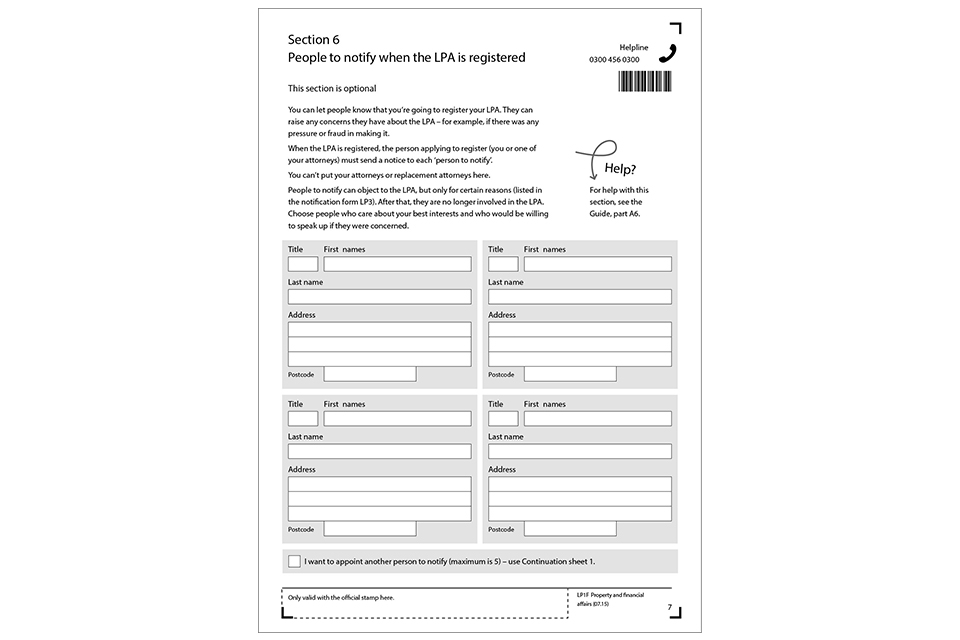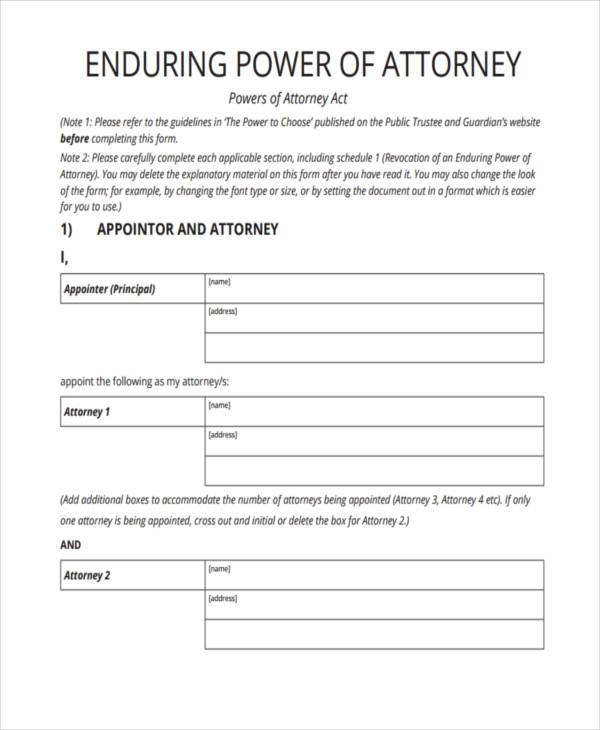Lasting Power Of Attorney Forms Uk
Putting in place a power of attorney can give you peace of mind that someone you trust is in charge of your affairs.
If you're aged 18 or older and have the mental ability to make financial, property and medical decisions for yourself, you can arrange for someone else to make these decisions for you in the future. This legal authority is called 'lasting power of attorney'.
The person who is given power of attorney is known as the 'attorney' and must be over 18 years old. You are known as the 'donor'.
Appointing attorneys
You can appoint just one attorney, or more than one attorney, to act:

UK Application to register a Lasting Power of Attorney Form LPA002 - PDF Template. This power of attorney registration page is only applicable for the United Kingdom and the countries of Wales or England. LPA002, Application to Register Lasting Power of Attorney facilitates the legal appointment of attorney/s by a donor to act on behalf of the donor upon the mental instability of the donor. This form is in.
- What is a Lasting Power of Attorney? There are two separate types of Lasting Power of Attorney: The 1st type is a Lasting Power of Attorney for money and property matters. The 2nd type is a Lasting Power of Attorney for Health Welfare matters.
- A Lasting Power of Attorney serves the same purpose as a Durable or Enduring Power of Attorney. Regardless of the official term for this document in a country or jurisdiction, the purpose is to empower your agent or attorney to make decisions on your behalf when you are no longer able to do so i.e. Become incapacitated. It therefore has lasting or enduring power.
- 'jointly' – they must always make decisions together
- 'jointly and severally' – they have to make some decisions together and some individually
For example, you can appoint attorneys to act jointly when making decisions over your money, but state that only one attorney should decide where you should live.
You have the right to say the attorneys must act jointly on all your affairs.
Types of power of attorney
There are 2 different types of power of attorney: lasting power of attorney (LPA) and enduring power of attorney (EPA).
LPAs came into force in October 2007. Before that, people made EPAs. It's no longer possible to make an EPA, but an EPA made before October 2007 remains valid.
Lasting Power of Attorney (LPA)
This includes:
- personal welfare LPA
- property and financial affairs LPA
Personal welfare LPA
Personal welfare LPA gives your attorney the power to make decisions about your daily routine (washing, dressing, eating), medical care, moving into a care home and life-sustaining medical treatment. It can only be used if you're unable to make your own decisions.
Property and financial LPA
Property and financial affairs LPA gives your attorney the power to make decisions about your money and property, including managing your bank or building society accounts, paying bills, collecting your pension or benefits and, if necessary, selling your home.
Once registered with the Office of the Public Guardian, it can be used immediately or held in readiness until required.
Enduring Power of Attorney (EPA)
An EPA deals only with property and financial affairs, not with personal welfare issues.
Applying for power of attorney
It's generally recommended that you set up both a personal welfare LPA and a property and financial affairs LPA at the same time.
Many people do this while reviewing or revising their will, and you may be able to use the same solicitor.
You can apply online for power of attorney on GOV.UK.
Alternatively, contact the Office of the Public Guardian for an application pack:
- by post at the Office of the Public Guardian, PO Box 16185, Birmingham, B2 2WH
- by phone on 0300 456 0300 – lines are open Monday to Friday, 9am to 5pm (Wednesday, 10am to 5pm)
Talk to a lawyer if you have problems answering any of the questions or if you want them to check what you have done.
You can call the Office of the Public Guardian or the Court of Protection first to see if they can help on 0300 456 0300.
Legal aid may be available for personal welfare LPA issues, but not for property and financial LPAs.
The Law Society will be able to tell you which solicitors offer legal aid. You'll only be eligible for legal aid if you pass a means test.
Contact the Law Society by writing to them at 100-113 Chancery Lane, London WC2A 1PL, or call 020 7242 1222.
You can also search for solicitors who specialise in this area on the Law Society online directory.
Registering the power of attorney
A power of attorney has to be registered before it comes into force. You can register a power of attorney on GOV.UK.
Either the person making the application for power of attorney (the donor) or the person who will have power of attorney (the attorney) can apply to register the application.
There is a 6-week notice period for any objections to be raised.
Once the power of attorney has been registered, the original document is returned to the applicant.
The Office of the Public Guardian also gives notice to the donor that the LPA has been registered.
Cancelling power of attorney
You can cancel your lasting power of attorney at any time, even if the application has been registered.
But you must have the mental capacity to make that decision, and you must tell your attorneys and the Office of the Public Guardian so they can remove the LPA from the register.
Power of attorney automatically ends if:
- the attorney or donor dies
- the attorney or donor becomes bankrupt (depending on circumstances outlined below)
- a marriage or civil partnership between the donor and the attorney is dissolved or annulled
- the attorneys lack the mental capacity to make decisions
The Court of Protection can cancel an LPA if an attorney isn't acting in a person's best interests and is making excessive 'gifts' to themselves or others.
Cancelling enduring power of attorney (EPA)
To cancel an unregistered EPA, you'll need to sign a formal document called a Deed of Revocation. You may wish to seek legal advice first.
You can cancel an unregistered EPA at any time while you have the mental capacity to do so.
If the EPA has been registered, you can't cancel it except by permission of the Court of Protection.
Advice for attorneys: personal welfare
Having an LPA over someone's personal welfare may mean you need to make decisions about the healthcare and welfare of the person you're looking after.
If you have this power, you may have to decide:
- where the person is to live
- whether a care home or a nursing home is best for them, and which one
- whether the person can continue to live at home with help from social services
You'll be able to decide if the donor should:
- receive healthcare treatment
- not receive a particular healthcare treatment
- stop receiving a particular healthcare treatment
Some people who have a progressive illness sometimes make a decision about whether they'd want a particular treatment in the future.
They write down or tell others these wishes while they're mentally well, or have 'mental capacity'.
If the donor made a decision to refuse future medical treatment (known as an advance decision) in advance of losing their mental capacity, you can't override their decision unless the LPA was made later and specifies that you have the power to do so.
What personal welfare power of attorney can't do

A health and welfare LPA doesn't come into force until the donor has lost the capacity to make decisions for themselves.
There are some decisions you as an attorney can't make for another person.
Lasting Power Of Attorney Form
You can't:
Lasting Power Of Attorney Template Uk
- refuse any medication prescribed by a responsible clinician if the person has been sectioned or is on leave from hospital
- make decisions about where they should live if the donor is under a guardianship order
- make a decision about life-sustaining treatment without checking whether the person has made an advance decision about this
Personal welfare power of attorney and restraint
If you have personal welfare LPA, you may sometimes consider 'restraining' (stopping or hindering) the person you're looking after from doing something you think will harm them or others.
Under the law, you're considered to be restraining someone if you:
- physically force them to do, or stop doing, something
- threaten to physically force them to do, or stop doing, something
- prevent them going somewhere or doing something they want to
- ask someone else to do any of the things listed above
You shouldn't restrain the person unless:
- you believe they don't have the mental ability or capacity to make a decision about that particular issue
- you believe it's necessary to use restraint to prevent them harming themselves
- it's a reasonable action to take because you believe they may suffer serious harm – for example, you could physically stop someone crossing the road if they were walking into traffic when it's safe for them to cross the road
Advice for attorneys: property and financial affairs
If you have lasting power of attorney over property and financial affairs, you're allowed to make decisions on the donor's behalf.
These include:
- writing cheques and paying bills
- selling or renting property
- carrying out their trade or business
- honouring any contractual obligations
- conducting legal proceedings on their behalf
You're also allowed to make gifts on behalf of the donor in certain circumstances.
For example:

- on occasions such as birthdays or marriages to those related to or connected with the donor
- to a charity the donor has supported in the past
Acting as an attorney means you should maintain a duty of care to the donor, not to benefit yourself. It's important to avoid any potential conflicts of interest.
Specifically, you must keep the donor's money and property separate from your own, and keep accurate accounts in all of your dealings as an attorney.
Find out more about power of attorney on GOV.UK.